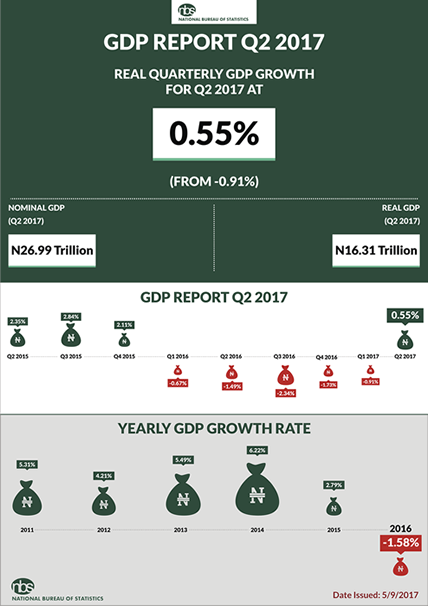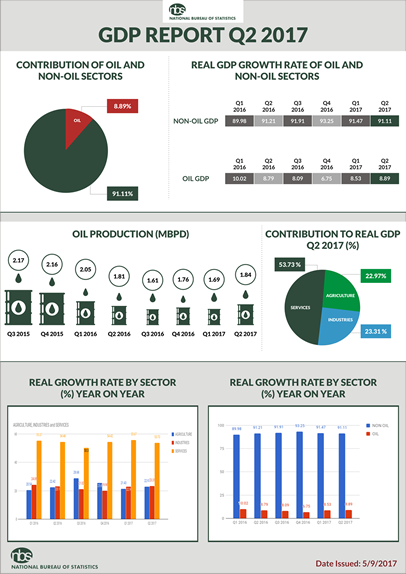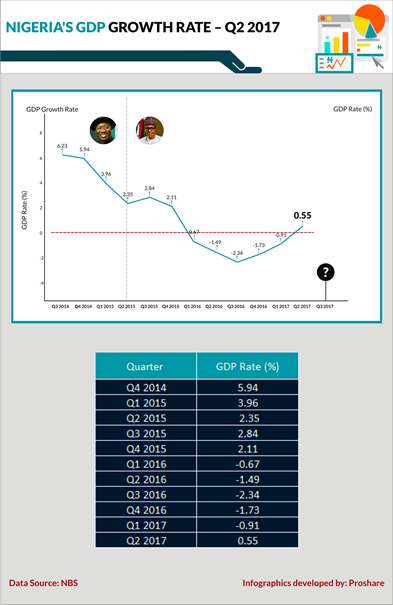Nigeria officially out of recession as GDP grows 0.55% in Q2
September 5, 20172.3K views0 comments
Nigeria is officially out of recession, according to growth data published by the country’s National Bureau of Statistics (NBS) Tuesday.
The NBS data indicate that Nigeria’s economy grew 0.55 percent in Q2 2017 compared to -0.91 percent (revised) in Q1 2017 and -1.49 percent in Q2 2016.
A Reuters’ poll had suggested at the weekend that Nigeria and South Africa, Africa’s two biggest economies, may likely emerge from recession in the second quarter of the year but strong growth won’t show up until business confidence is restored.
Read Also:
The poll, which comes ahead official growth data released Tuesday, specifically predicted that Nigeria would come clearly out of recession but needs to restore business confidence through the adoption of a single foreign exchange policy for sustainability.
According to the poll, Nigeria and South Africa have both benefited from a recovery in commodity prices since early 2016, though not as much as their main trading partners — China, the US and the euro zone.
“Both countries have bounced off the bottom, but the sustainability is in question. Nigeria needs a single FX policy and South Africa needs more policy certainty,” said Aly-Khan Satchu, CEO of Rich Management in Nairobi.
Nigeria, the continent’s most populous country, had been in recession since late 2015, while South Africa confirmed a technical recession in the first quarter of this year.
The Reuters poll showed Nigeria’s economy broke out of a long slump in the second quarter with a median forecast for 1.55 percent year-on-year growth while South Africa quit shrinking with 2.2 percent quarter-on-quarter growth.
“We expect a return to positive year-on-year growth in Nigeria, helped by improved foreign exchange availability and a recovery in oil production,” Razia Khan, head of Africa research at Standard Chartered, was quoted as saying.
Nigeria has suffered from dollar shortages and falling commodity prices that have affected Africa’s major crude exporters. The crisis has been exacerbated by limits on what citizens can import as authorities try to stop the naira sliding.
During the quarter, aggregate GDP stood at N26,986,005.20 million in nominal terms, compared to N23,547,466.91 million in Q2 2016, resulting in a Nominal GDP growth of 14.60%. This growth was higher relative to growth recorded in Q2 2016 (3.01%). The Nigerian economy can be more clearly understood when classified into oil and non-oil sectors.
The Oil Sector
During the period under review, Oil production is estimated to have averaged at 1.84million barrels per day (mbpd), 0.15million barrels higher than the daily average production recorded in the first quarter of 2017 (June 2017 is estimated and may be revised).
Oil production during the quarter was higher by 0.03million barrels per day relative to the corresponding quarter in 2016, which recorded an output of 1.81mbpd. (Figure2) Note that oil output for March 2017 has been revised; this affected average output for the first quarter 2017 from 1.83mbpd to 1.69mbpd.
The Non-Oil Sector
The major driver of growth in the Non-oil sector was the Agriculture Sector( Crop Production), finance & insurance, Electricity, gas, steam and air conditioning supply and Other Services. The non-oil sector grew by 0.45% in real terms during the reference quarter.
This was 0.83 percent point higher than the rate recorded second quarter, 2016 and -0.28% point lower than in the first quarter of 2017. In real terms, the Non-Oil sector contributed 91.11% to the nation’s GDP, lower from share recorded in the second quarter of 2016 (91.21%) and in the first quarter of 2017 (91.47%).







